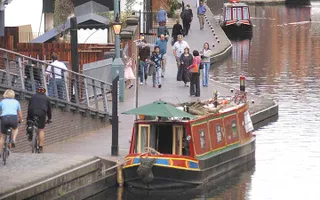The National Planning Policy Framework in promoting healthy communities makes clear the importance of planning for shared space and community facilities. Our network provides opportunities to improve social interaction and access to both formal and informal recreation along or beside our waterways.
Social inclusion and accessibility
Over the last 20 years, waterways have been both the catalyst and the focus for an immense amount of regeneration and development activity which has acted to build developer and investor confidence, particularly in disadvantaged areas and contributed to social inclusion. Waterways and towpaths provide a range of outdoor space for cultural, civic, learning and community activity and local heritage.
With waterways on many disadvantaged local communities' doorsteps, they have an important role to play in skills development and youth social action. Learning outside the classroom is proven to tackle social mobility and be of particular help to young people from disadvantaged backgrounds, increasing self-esteem, raising levels of attainment and improving mental health and wellbeing.
Health, wellbeing and happiness
Economic prosperity depends on having a healthy and active workforce. Waterways have a significant role to play, particularly in tackling physical inactivity, obesity and reducing stress, especially in the many disadvantaged communities with waterways on their doorstep.
Independent research shows that spending time by the waterways can make you happier and improve life satisfaction, with an equivalent estimated social wellbeing value of £3.8bn per year.
The Town and Country Planning Association set up the 'Developers and Wellbeing' project in 2017. Their report details the principles of healthy place making and, using the findings from several case studies, sets out key messages as to how collective action between developers, local authorities and wider stakeholders such as the Trust can help lead to the development of new sustainable, high quality, healthy places.
The Desmond Family Canoe trail project is a community initiative that ran through Wigan and Burnley where youth unemployment (44%) and child obesity (32%) are well above the national average. Over five years, the project engaged with 15-24-year-olds and their families through Canoe Action Squads and recruited volunteers aged 15-25. Getting young people into canoes and onto our waterways helped introduce them to healthy lifestyles, build confidence and new skills in communication, project management, leadership, and develop a sense of belonging to place and community.




